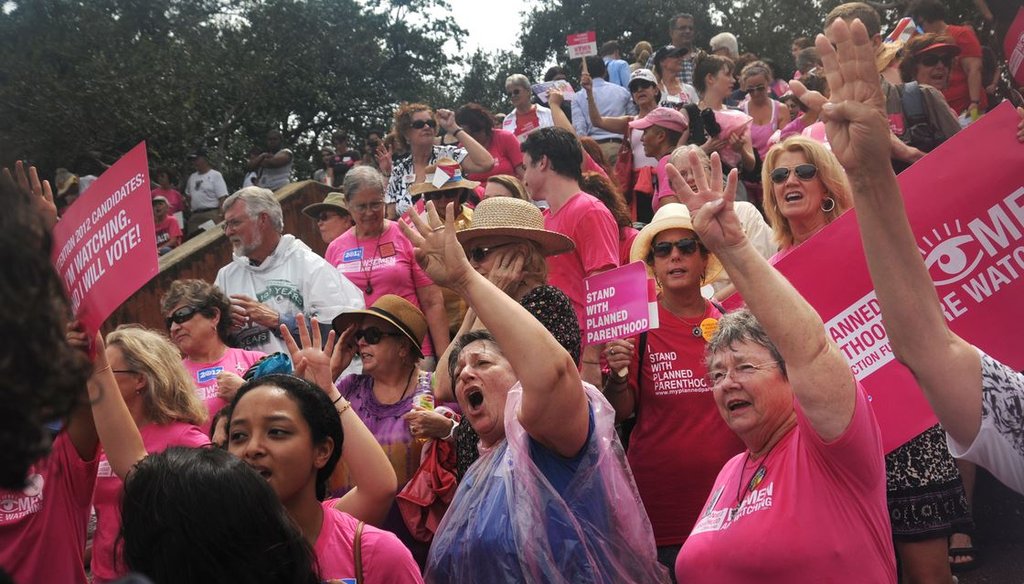Stand up for the facts!
Our only agenda is to publish the truth so you can be an informed participant in democracy.
We need your help.
I would like to contribute

Planned Parenthood supporters chant "four more years!" during a rally during the second day of the Republican National Convention August 29, 2012 in Tampa, FL. (Leah Millis | Tampa Bay Times)
An anti-abortion activist group released a video that they say proves Planned Parenthood "sells the body parts of aborted fetuses."
Is it misleading?
Posing as a biological tissue procurement company, actors for the Center for Medical Progress secretly filmed a luncheon with Planned Parenthood’s senior director of Medical Services Dr. Deborah Nucatola in 2014. On July 14, 2015, the group released a nine-minute video that they say shows Nucatola talking about performing partial-birth abortions to keep body parts intact in order to "sell" them, an action which the video alleges is a felony.
Nearly every Republican presidential candidate has responded, condemning Planned Parenthood. And Congress, as well as the states of Texas and Louisiana, have called for investigations into the women’s reproductive health care organization.
Many, including Planned Parenthood, have said the video was heavily edited and is misleading. They say Nucatola was discussing a standard, legal procedure for providing fetal tissue for scientific research, for which clinics are often reimbursed for costs associated with procuring the tissue (as opposed to selling tissue for a profit).
Sign up for PolitiFact texts
Who’s right? We read the 60-page transcript of the nearly three-hour luncheon and found that Nucatola reveals very little concrete information on Planned Parenthood’s practices. Put simply, there’s no clear gotcha.
We’ll leave it up to readers to come to their own conclusions about Planned Parenthood’s practices and Nucatola’s statements, but we want to highlight a few key moments in the conversation to put the edited video in context.
It’s clear in the full-length video that Nucatola believes she is speaking with representatives from a company that provides scientific researchers with tissue from aborted fetuses (a legal process that raises difficult ethical questions). She describes the process of getting consent from patients, as well as how Planned Parenthood clinics typically interacts with the companies that take the tissue from the clinics to the researchers.
The edited video shows Nucatola discussing a per-specimen price range for tissue parts. But the full video shows that the cost under discussion is a reimbursement for the cost of preparing the specimens for transfer, not the value of the specimens themselves. She adds that Planned Parenthood needs to be able to explain exactly what the funds are used for.
Asked by the actors about a price range, Nucatola said:
"You know, I would throw a number out, I would say it’s probably anywhere from $30 to $100 (per specimen), depending on the facility and what’s involved. It just has to do with space issues, are you sending someone there who’s going to be doing everything, is there shipping involved, is somebody going to have to take it out? You know, I think everybody just wants, it’s really just about if anyone were ever to ask them, ‘What do you do for this $60? How can you justify that? Or are you basically just doing something completely egregious, that you should be doing for free.’ So it just needs to be justifiable.
"The way they budget (for the cost of producing a specimen) is by the amount of time they spend on one patient. … It depends, if (the procurement service is) expecting somebody to process, and package, identify tissue for you, it’s going to be at the higher end of the range. In all cases, it’s really going to be about staff time, because that’s the only cost to the affiliate. And then, if you want space."
Nucatola also said Planned Parenthood affiliate clinics appreciate that they can reduce some of their overhead costs of disposing of aborted fetal tissue by using a tissue procurement service.
Nucatola said:
"I think for affiliates, at the end of the day, they’re a nonprofit, they just don’t want to — they want to break even. And if they can do a little better than break even, and do so in a way that seems reasonable, they’re happy to do that. Really their bottom line is, they want to break even. Every penny they save is just pennies they give to another patient. To provide a service the patient wouldn’t get.
"No one’s going to see this as a money-making thing. The other reason affiliates think this is a good thing is, it’s less tissue that they need to worry about, it’s taken care of. They have to do something with that tissue, it’s hard to find somebody that wants to do something with that tissue, so the fact that there’s somebody that’s looking for that tissue is -- that is such a huge service to them."
Nucatola says throughout the luncheon that Planned Parenthood is not interested in making a profit off the specimens -- an interpretation the edited video pushes.
"(Clinics) want to do this, but they want to do it in a way that’s not going to impact them, and it’s much much less about money. You could call them up and say, ‘I’ll pay you double the money,’ and they’re almost more inclined to say no, because it’s going to look bad. … To them, this is not a service they should be making money from, it’s something they should be able to offer this to their patients, in a way that doesn’t impact them.
"Again, affiliates don’t — affiliates are not looking to make money by doing this. They’re looking to serve their patients and just make it not impact their bottom line.
"At the end of the day we just want to keep the doors open. And we don’t want to let jeopardize keeping the doors open. We just want (the cost per specimen) to be reasonable for the impact it has on the clinic. This is not a new revenue stream the affiliates are looking at. This is a way to offer the patient the service that they want. Do good for the medical community.
"Like I said, is to give patients the option without impacting our bottom line. The messaging is this should not be seen as a new revenue stream because that’s not what it is."
The actors in the video act as if they are on the same page:
Actor: "I understand what you’re saying. This cannot be seen as, ‘We’re doing this for profit.’ "
Nucatola: "No. Nothing, no affiliate should be doing anything that’s not like, reasonable and customary. This is not -- nobody should be ‘selling’ tissue. That’s just not the goal here."
Actor: "Right. And, I never see that as, I don’t look at it that way, we’re not selling tissue, we’re selling the possibility of what the research can offer."
Nucatola: "I think we all would agree with you. That’s just not the perception, sadly, for everybody."
Actor: "I mean, researchers are paying for procurement, they’re not paying for — You’re not buying a brain, you’re buying a procurement service."
Nucatola: "Exactly. Exactly."
The conversation indicates that at least some Planned Parenthood clinics do sell aborted fetal tissue. But Nucatola plainly argues that the money they’re charging is trying to offset the costs associated with tissue procurement -- a legal service.
Our Sources
Center for Medical Progress, "Planned Parenthood’s Top Doctor, Praised by CEO, Uses Partial-Birth Abortions to Sell Baby Parts," July 14, 2015
Health and Human Services, "Part G of title IV of the Public Health Service Act," June 10, 1993
Planned Parenthood, "Statement from Planned Parenthood on New Undercover Video," July 14, 2015
Washington Post, "Congressional, state investigations into Planned Parenthood underway after undercover video goes viral," July 15, 2015
Time, "Republican Presidential Contenders Slam Planned Parenthood Over Video," July 14, 2015
Slate, "What Is the Center for Medical Progress, the Group Behind the Latest Viral Abortion Video?" July 15, 2015
Snopes, "Baby parts for sale," July 14, 2015


















































